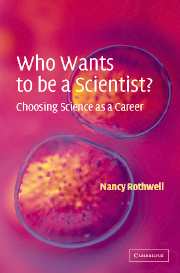Book contents
- Frontmatter
- Contents
- Preface
- 1 Introduction
- 2 Starting out in research
- 3 Getting down to research
- 4 Scientific ethics and conduct
- 5 Publish or perish?
- 6 Communication and getting known
- 7 Moving up
- 8 Responsibilities
- 9 Funding research
- 10 Who owns science?
- 11 Science and the public
- 12 Power, pressure and politics
- 13 Social aspects of science
- 14 So who does want to be a scientist?
- Index
14 - So who does want to be a scientist?
Published online by Cambridge University Press: 06 July 2010
- Frontmatter
- Contents
- Preface
- 1 Introduction
- 2 Starting out in research
- 3 Getting down to research
- 4 Scientific ethics and conduct
- 5 Publish or perish?
- 6 Communication and getting known
- 7 Moving up
- 8 Responsibilities
- 9 Funding research
- 10 Who owns science?
- 11 Science and the public
- 12 Power, pressure and politics
- 13 Social aspects of science
- 14 So who does want to be a scientist?
- Index
Summary
Among scientists are collectors, classifiers and compulsive tidy uppers, many are detectives by temperament and many are explorers; some are artists and others are artisans. There are poet scientists and philosopher scientists and even a few mystics.
Maybe it is hard to decide if you want to be a scientist because there are so many aspects to science, and scientists do so many different things. As Medawar noted (above) scientists come in every shape and form. The stereotypical scientist – the ‘man’ of logic, careful judgement and assessment who has a logical view of the world, sets up hypotheses and then tests them – is far from reality. Successful science demands imagination, and insight, sensitivity and common sense, as well as a passion for discovery.
This book has, by necessity, focussed on the potential problems faced by scientists moving up their careers, and has tried to provide some advice. Most scientists will hopefully encounter few, if any, of these problems and will rely simply on their own drive and initiative, on friends and colleagues and a sense of fair play. To highlight the potential problems may lead to a rather pessimistic view of research, which is not well founded. Few scientists encounter serious cases of fraud or plagiarism, unfairness or unwillingness to share, discrimination or prejudice. For the most part, the scientific community is remarkably open, friendly and welcoming – and a pleasure to work with. Some of the issues mentioned in this book are ones which you should be prepared for, but do not look for them around every corner.
- Type
- Chapter
- Information
- Who Wants to be a Scientist?Choosing Science as a Career, pp. 161 - 162Publisher: Cambridge University PressPrint publication year: 2002



